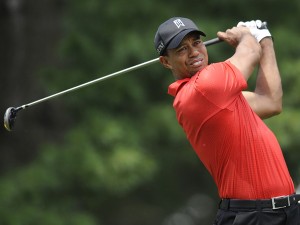Tiger Woods gets a reprieve in the Masters
AUGUSTA, Georgia— Tiger Woods got a reprieve Saturday in the Masters when he was given a two-shot penalty for a bad drop but was allowed to stay in the tournament.
Woods’ shot on the par-5 15th hole of the second round hit the flag stick and bounced back into the water. He took his penalty drop two yards behind where he hit the original shot, which was a rules violation.
Article continues after this advertisementAugusta National reviewed the incident Saturday morning before the third round began and added the two-stroke penalty for an improper drop. Woods had a 73 instead of a 71 and went into the weekend five shots out of the lead.
But they did not disqualify him for signing an incorrect scorecard under a new rule — announced at the Masters two years ago — that allows a player to stay in the tournament if a rules dispute was based on television evidence.
The decision grabbed more attention than any shot at this Masters, especially coming one day after 14-year-old Guan Tianlang was penalized one shot for slow play, which nearly caused him to miss the cut. Woods not only is the No. 1 player and golf’s biggest star, he had won two straight tournaments coming into the Masters. He was the overwhelming favorite to win, ending a five-year drought in the majors, and capture the green jacket for the first time since 2005.
Article continues after this advertisementWhile the violation was apparent, Augusta National took the blame by saying its rules committee reviewed a video before Woods finished his round Friday and determined his drop was within the rules. The club said a television viewer prompted the review.
Golf is the only sport where TV viewers act as rules officials. If they see a violation and it turns out to be true, a player must be penalized.
Woods, however, indicted himself by explaining how he took the drop.
“I went back to where I played it from, but went two yards further back and I tried to take two yards off the shot of what I felt I hit,” Woods said Friday after he signed for a 71, leaving him three shots out of the lead. “And that should land me short of the flag and not have it either hit the flag or skip over the back. I felt that was going to be the right decision to take off four (yards) right there. And I did. It worked out perfectly.”
He hit that fifth shot to about 4 feet and made the putt for bogey.
Rules 26-1 says that if a player chooses to go back to his original spot, the ball should be dropped as “nearly as possible” to the spot where it was last played. Photos and video shows his ball dropped at least a yard behind his previous divot.
“After meeting with the player, it was determined that he had violated Rule 26, and he was assessed a two-stroke penalty,” Fred Ridley, chairman of the Masters’ competition committees, said in a statement. He said the penalty of disqualification was waived under Rule 33 because the committee “had previously reviewed the information and made its initial determination prior to the finish of the player’s round.”
Rule 33 states that disqualification can be waived at the committee’s discretion. However, a decision that accompanies this rule says that the committee would not be justified to waive the DQ if it was a result of the player’s ignorance of the rules or if he could have reasonably discovered his mistake before signing his scorecard.
